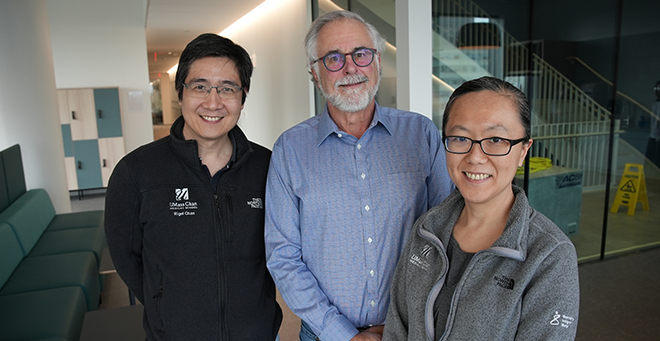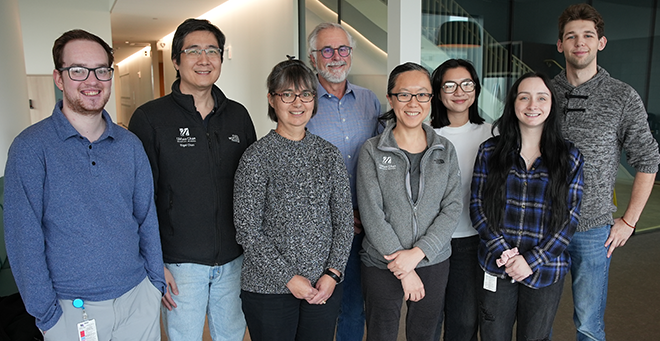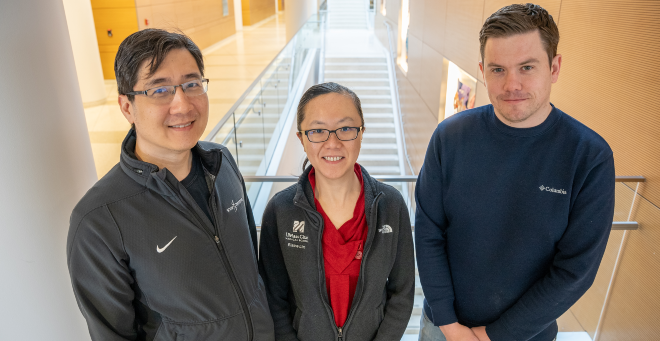
UMass Chan researchers Rigel Chan, PhD; Timothy Kowalik, PhD; and Elaine Lim, PhD
A team of researchers from UMass Chan Medical School have collaborated on a study that revealed a connection between human cytomegalovirus, or HCMV, and Alzheimer’s disease.
The study, led by Arizona State University and the Banner Alzheimer’s Institute, aimed to understand the mechanistic link between viral infections such as HCMV and neurodegenerative diseases such as Alzheimer’s, potentially leading to preventive measures and interventions, including vaccines.
“The team at Arizona State made this interesting discovery that HCMV could impact Alzheimer’s disease. We collaborated with them using human brain organoids [lab-grown stem cells that mimic human brain stem cells] to understand what happens when we infect the organoids with HCMV. We saw strong molecular signatures linked to Alzheimer’s disease,” said Elaine Lim, PhD, assistant professor of medicine.
“The human data implicated HCMV infection in Alzheimer’s disease pathology. Those individuals with HCMV have a particular signature of microglia activity in their brains,” said Rigel Chan, PhD, assistant professor of neurology.

The UMass Chan research team, from left: bioinformatician Nathaniel Barton; Rigel Chan, PhD; research associate Anne Mirza; Timothy F. Kowalik, PhD; Elaine Lim, PhD; and graduate students Khanh Tran, Samantha Chigas and Adrian Orszulak.
The study’s findings, published in December in Alzheimer’s & Dementia: The Journal of the Alzheimer’s Association,” found a connection between a chronic gut infection caused by HCMV and the development of Alzheimer’s in some people. HCMV is one of nine herpes viruses and can linger in the gut, then travel to the brain via the vagus nerve, the main nerves of the parasympathetic nervous system connecting the gut and brain. This may alter the immune system and contribute to changes associated with Alzheimer’s.
“More or less, everyone has human cytomegalovirus. As we get older, our immune system weakens. Part of that’s driven by HCMVs, so viral infections tend to appear in older people,” said Timothy F. Kowalik, PhD, professor of microbiology. “We’re working toward the mechanistic part of how this happens, how HMCV impacts the brain. The research is provocative and very exciting.”
“It’s become increasingly clear that Alzheimer’s disease is a dysregulation of the brain’s innate immune system and that many years of chronic neuroinflammation of the brain is one of the causal mechanisms in Alzheimer’s disease,” Dr. Chan said.
If the researchers’ hypotheses are confirmed, they may be able to evaluate whether existing antiviral drugs or other therapeutic compounds could treat or prevent this form of Alzheimer’s disease.
The study included researchers from the Banner Sun Health Research Institute, the Translational Genomics Research Institute, the Institute for Systems Biology, Rush University Medical Center, Icahn School of Medicine at Mount Sinai and other institutions.
The UMass Chan team includes Drs. Chan, Kowalik and Lim; bioinformatician Nathaniel Barton; research associate Anne Mirza; and graduate students Samantha Chigas, Adrian Orszulak and Khanh Tran.


